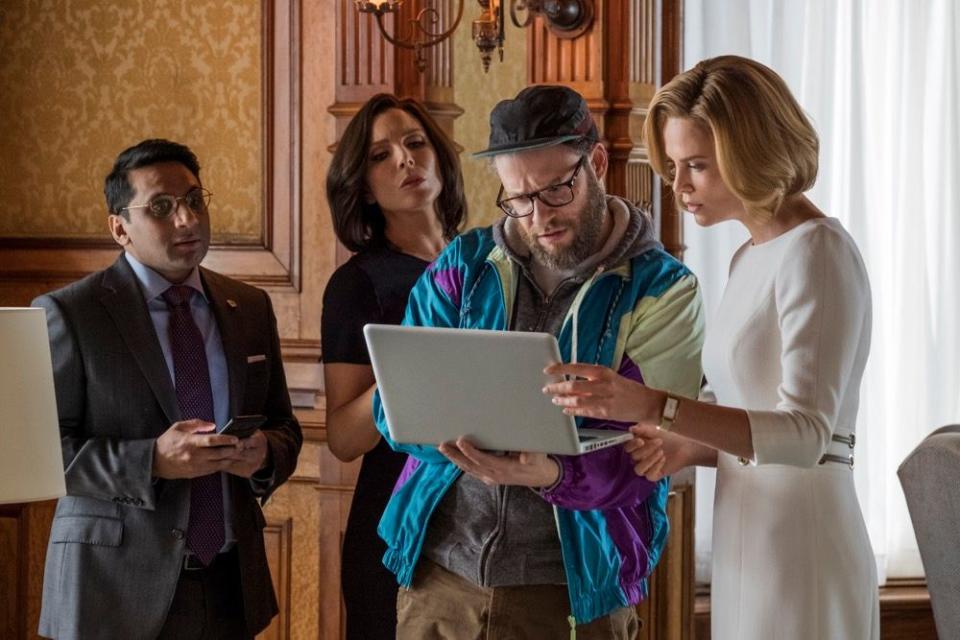Long Shot’s Jonathan Levine on Loving Springsteen, Cameron Crowe Flicks, and the Halloween Franchise
Jonathan Levine loves a lot of things.
He has an affinity for Bruce Springsteen. He adores Cameron Crowe movies. He even appreciates the Halloween franchise, worts and all. But really, he has a grip on what makes humanity tick, and his ensuing filmography reflects that, particularly his latest film.
Starring Charlize Theron and Seth Rogen, Long Shot follows a cutthroat journalist (Rogen) who begins to fall in love with his former babysitter (Theron), who just so happens to be making the leap from Secretary of State to Commander in Chief. No big deal, right?
It’s not, though. The film’s unlikely matchup and premise oozes with so much heart and personality that you can’t help but succumb to its whims and charms. It’s a total anomaly in an era of Veep and House of Cards, but that’s also why it’s something to relish.
Again, it all goes back to Levine. As he proved with 2008’s The Wackness, 2011’s 50/50, and 2013’s Warm Bodies, this is a guy who knows how to find heart and humor in the most unexpected places, and part of the magic is in how he lets you in on that discovery.
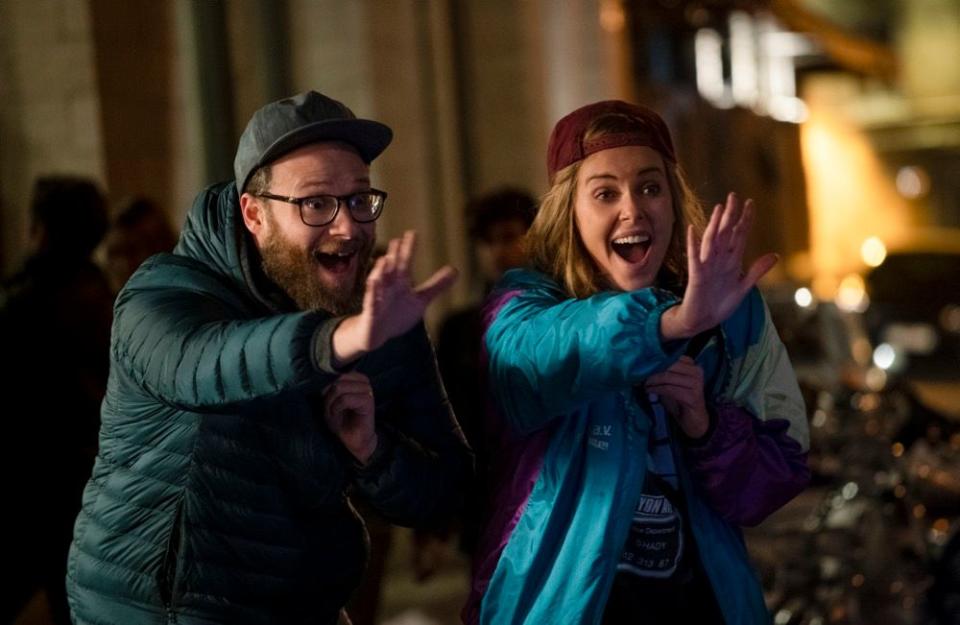
Long Shot (Paramount)
Recently, Consequence of Sound‘s Editor-in-Chief Michael Roffman spoke to Levine about that magic. Together, they discussed past favorite rom-coms, the subtle influence of Trump’s America, and the cinematic majesty of New Jersey’s greatest singer-songwriter..
How did Boyz II Men get involved? Were they always written into the script?
No, they weren’t written into the script. So, I’ve done this a couple times now, and Seth [Rogen] and Evan [Goldberg] have done it even more times than I have, where you just sort of write, “There’s an amazing party and there’s an amazing band on stage.”
We did that with The Night Before and we were lucky enough to get Miley Cyrus, and in this one we were lucky enough to get Boys II Men. You know, you really want it to be someone poppy because these movies are pop culture confections, but also someone you like. So, in the case of Miley and Boys II Men, I just really love both of them.
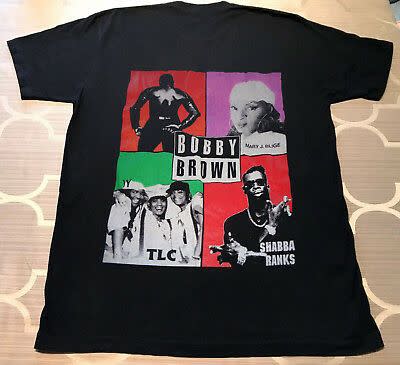
But Boys II Men, I remember being 12 years old and buying that CD and just loving it. I used to rock these Bobby Brown pins. I was really into Bobby Brown. In fact, Bobby Brown, TLC, and Shabba Ranks in Providence, RI was one of the first concerts I ever saw. So, when Michael Bivins introduced Boys II Men to the world, I was like one of the first fans. I was at HMV buying the CD opening day.
So, we knew wanted it to be someone from their youth and someone that would connect to the young idealist — the person they were trying to be — when they were young and why they got into their job in the first place. That’s such a big theme of the movie, and I think that’s such a resonating feeling for any job, but especially politics. They were connecting over a lot of their youth and a lot of the nostalgia of their youth… and so Boys II Men, I thought, were perfect.
Music has such an important role in each of your films, whether it’s Pearl Jam’s “Yellow Ledbetter” in 50/50 or Springsteen’s “I’m on Fire” in Long Shot. How involved are you in that process? And how much are the choices autobiographical?
I love talking about this shit. [Laughs.] We have an amazing music supervisor [Gabe Hilfer] we’ve worked with on many, many films, and we have a process. A lot of the more impactful cues in a movie are handpicked by me. That’s usually for only half of the movie, and then there’s these other amazing cues that he gets to pick, or we collaborate on.
But the ones you mentioned like “Yellow Ledbetter” at the end of 50/50 … we did not know how to end that movie. We had an amazing composer in Michael Giacchino, but this was sort of the start of the process I have, where I grab the scene from the editor, put it on my laptop, and I really just put it up against my iTunes library and try song after song after song.
And I remember the first time I really did that was for 50/50 at the very end, and I had Seth and Evan and our producers come over, and I played them five or six songs and as soon as we heard that, we got chills, because it hits you and then it just fades to black.
I like to use music to inject soul and a depth of feeling into these movies that can be bittersweet, for lack of a better word, and those two inclusions you mention are very reminiscent of Cameron Crowe. And Cameron Crowe was a big, big reference point for both 50/50 and [Long Shot]. For this movie, it was more in the vein of Jerry Maguire and Say Anything….
But for Bruce, Seth knows, like now we’ve done three movies together, that I’m in love with Springsteen. I’ve seen Bruce Springsteen, I don’t know, 20 times. I’m a huge Bruce fan. Other than my wife, the most important person in the world — and my son, and my son.
So, basically, there’s this line in the movie, where Seth tells Charlize, “I saw you on stage with Bruce Springsteen at that benefit,” and I can’t remember if Seth ad-libbed it or we wrote it right before we shot it, but I felt it was like a little Easter egg for me. Of course it makes sense in the context of the scene, but I was really grateful that he teed it up, and so I was like, “Well, okay, I’m gonna try a bunch of Bruce Springsteen songs.”
I just love the notion of “I’m on Fire”. It’s so evocative and so cinematic. There’s something about that ‘80s production, but when you get Bruce, whether the song’s about falling in love or not — and this is something Cameron Crowe does really well — you get the feeling of rolling the window down, the wind blowing through your hair, and that anything’s possible.
To me, that’s so associated with the feeling of falling in love with your soulmate for the first time. So, whether the content in the Bruce song is romantic or not, the world view is so romantic, and that’s something I really wanted to capture.
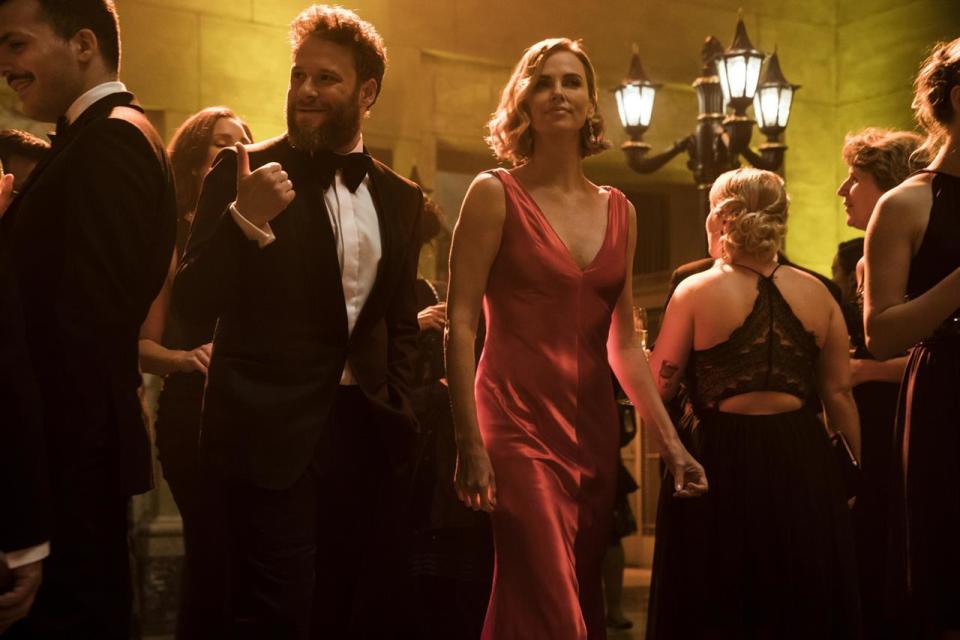
Seth Rogen and Charlize Theron in Long Shot
The film suggests that the American public doesn’t really care about facades anymore, that there’s no real egg-in-the-face moment, which is certainly a truth for Trump. Do you think, like the movie suggests, that notion might extend beyond this candidacy? And to the left?
Yeah, I think it was very important for us for the movie to zoom out and look at the country independent of Trump. In this movie, we exist in a parallel universe and we do so in order to poke fun at the human condition and who we are as a country.
We just wanted to say, with her character at least, that staying true to your ideals and being yourself is a good thing. So, obviously, what’s going with the president … I guess you can’t accuse of him not being himself, but you can certainly accuse him of not being honest.
I think that the honesty we’re advocating is being true to your own character and your own ideals, but at the same time, we exist in a modern world, and if your boyfriend is going to have an embarrassing video … that’s something we explored. So, that’s something where the characters have no choice but to say, “This is who we are.”
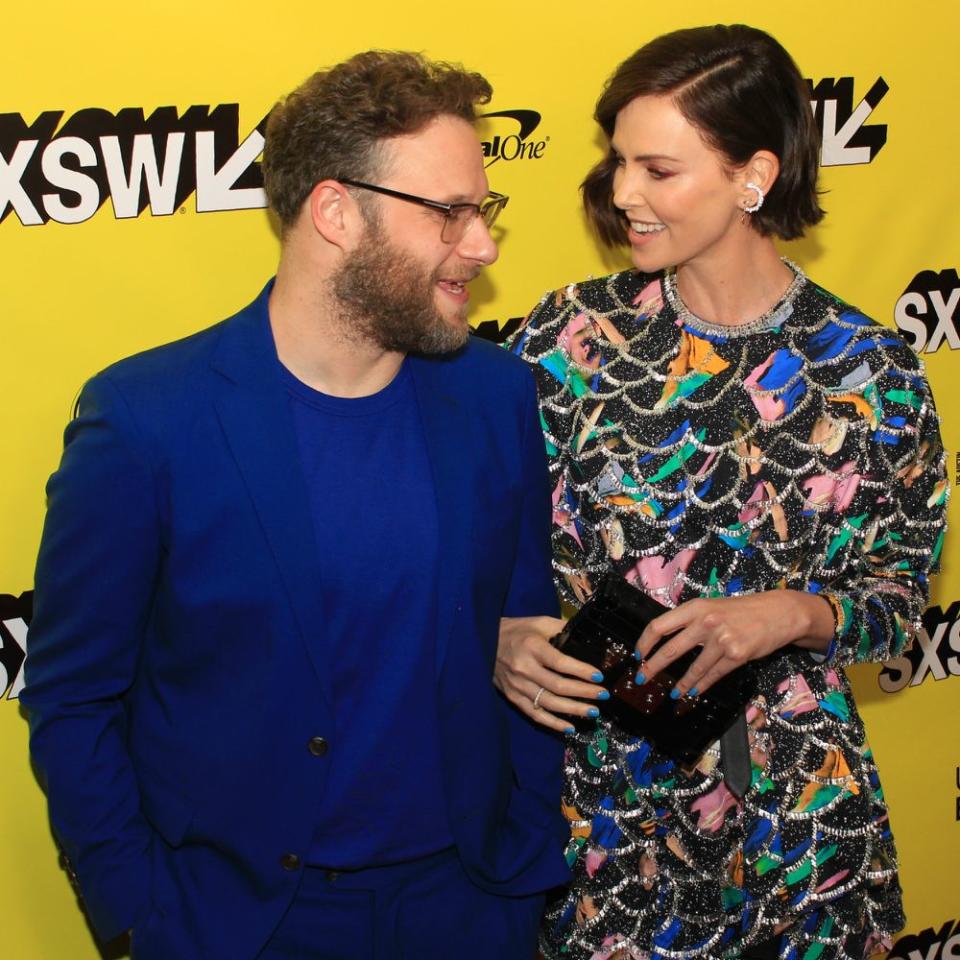
Seth Rogen and Charlize Theron at Long Shot SXSW World Premiere, photo by Heather Kaplan
It’s hard to really parse out any good that could come from the type of personality we currently have in the White House. But I certainly think that the forced honesty and the transparency of it could certainly lead to a more forgiving populous, which I think could be a force used for good. Because we’re all flawed, and the notion that we need to hide those flaws, I do think, is becoming a very antiquated thing.
I think once Charlize’s character learns to embrace every side of her that becomes a very liberating thing for her. I think that’s a universal truth that were we not in such a charged time, we could all agree upon.
The movie has this true blue sense of escapism to it, where you almost romanticize the political office in a way that hasn’t been done since the ’90s, particularly with The American President or even Dave. Was that intentional?
Right, and those movies like Dave and The American President, were huge reference points for me. But the other thing is that nuanced political insight is not necessarily the goal of this movie. It’s first and foremost a fairy tale, so it was important for us to have a light touch when it came to that stuff.
At some point, does this become like the Heather Locklear ad where one comic tells their friend and so on and so on? Or was everyone literally cast separately?
We have a lot of things going for us as far as trying to attract talent. Seth and Evan, they don’t just make good comedies, they make comedies that try to push the conversation forward with enhanced degree of difficulties that I think comedians and funny people respect. That’s how Bob Odenkirk came to us, that’s how Andy Serkis got to us.
Charlize and [Alexander] Skarsgård knew each other, and I thought it would be fun to give Alexander a chance at comedy because I’m such a huge fan of his, and I’ve never seen him do it. Usually, when you roll the dice on an amazing actor, especially one who we know gets along with people and our cast, it’s a good bet.
But the other important thing for us is that we wanted the stakes of the movie to feel real. Of course, we always wanna work with funny people we know, but we didn’t want the audiences to see too many people from Neighbors or This is the End or other movies that Seth had been in because we felt that would undermine the real stakes of the film.
So, for June [Diane Raphael] and O’Shea [Jackson, Jr.] and Ravi [Patel], those were exhausting casting calls. Ultimately, O’Shea read opposite Seth, and the two had this incredible chemistry from the very first second. And June is someone who those guys had worked with before and I wasn’t as familiar with, but I saw her audition, and while funny, it was also incredibly heartfelt. I felt the dramatic stakes. So, when Seth told me that she was also an adept improviser, that just felt too good to be true. She’s just so great.
Your movies have this rewatchable factor that makes them so hard to leave. You really craft a cozy world. Is that a feeling shared behind the scenes for you?
Yeah, you know it really is. The reason I wanted to work with Seth and Evan in the first place is because Seth, when you watch him on screen, he looks like the type of person who you want to be friends with. And when you get to become friends with him, it’s exactly as you want it to be, and we get to hang out on weekends sometimes. I remember on 50/50 we were at a party — I think it was in Vancouver, Seth’s parents live there, and we were at their house — and I remember Evan saying, “This doesn’t happen often. The last time we felt this way was on Superbad.”
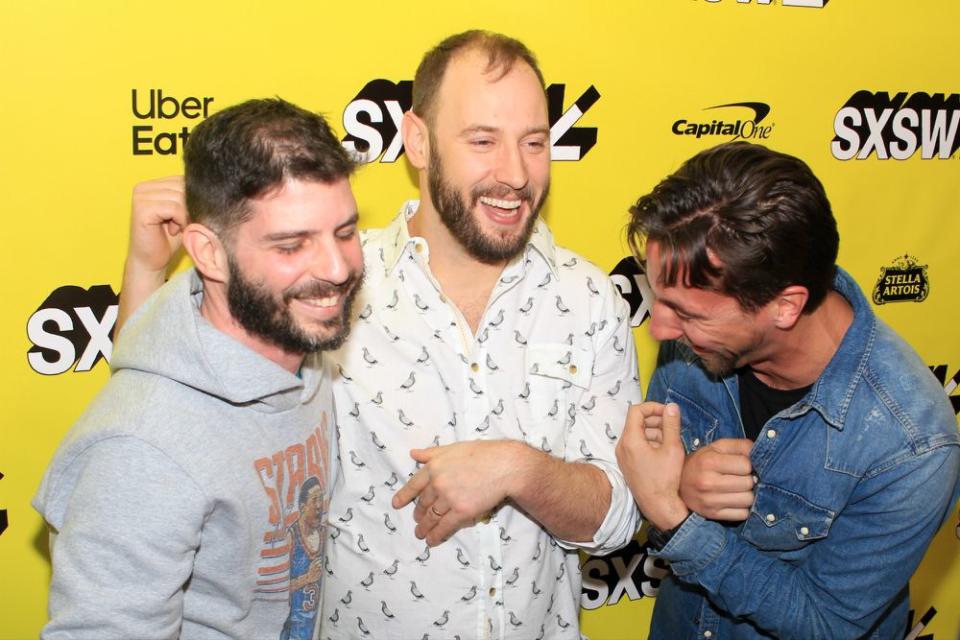
Jonathan Levine, Evan Goldberg, and James Weaver at Long Shot SXSW World Premiere, photo by Heather Kaplan
And on this movie, we hit a rhythm, not just on screen, but off screen, and it’s a really nice group of people who like to joke around, but also take their joking seriously. And you bring Charlize into a situation like this — and we’ve been lucky to work with some amazing actors, but she is next level, I mean she’s an Oscar-winning movie star — you don’t know culturally if that’s gonna be a good fit.
You have a feeling, though, because obviously she likes Seth’s movies, otherwise she wouldn’t want to do a movie with him. But we just hit it off so well and I think that she really enjoyed dropping into our process where we’re continually reworking scenes, we’re continually pushing the content of the things until they’ve reached our threshold of what’s great, and it’s probably a little different from what she’s used to in the past.
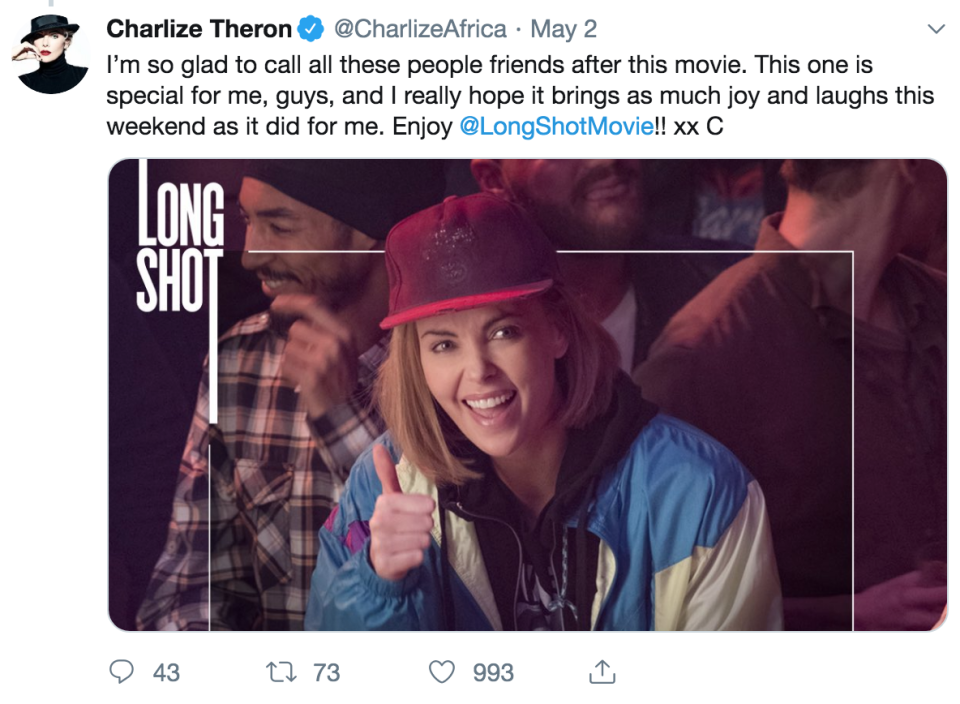
We had shot in Montreal up until early January, and then we went to Cartagena, which doubled not just for Columbia but for a few other countries, and we ended it on these islands there. So it was hot and we could drink and it was just so fun. The last few days really did have this summer camp vibe, so it does kind of suck ending a movie because everyone goes back to their own lives. Well, except me, I go right back into the movie.
But what’s really cool is that, now that we’re doing press, I get to hang out with these guys again, and I’ve made seven movies now, you’re not always as excited to see press with them as you are in this one. So the fact that we all get to see each other, and we’re all in it together makes it really fun, and I do feel like I’ve made some lifelong friends. But more than that, we’re also really proud of what we all did, and that’s just nice to reconnect over.
With horror on the rise right now, are there any plans to return to the genre?
Yeah, totally. 100 percent. I sort of know David Gordon Green a little bit. He was very nice to me when I was first trying to break out. Right after I made All the Boys Love Mandy Lane, he was making Pineapple Express, and I reached out to him. We had a friend in common, and he kindly went out to breakfast with me on the morning of a shooting day, which he didn’t have to do. But he’s been very nice to me throughout my career.
When I saw what he was able to do with [last year’s] Halloween … which, by the way, is a film franchise that, for some reason, I love so much. Like, I’ve just seen every Halloween. I even like Halloween 4, which I find to be a very underrated film. Anyway, I saw what he was able to do with that, and I was blown away. But I think what’s great about horror is, like comedy, it can be a Trojan Horse to explore social and cultural things.
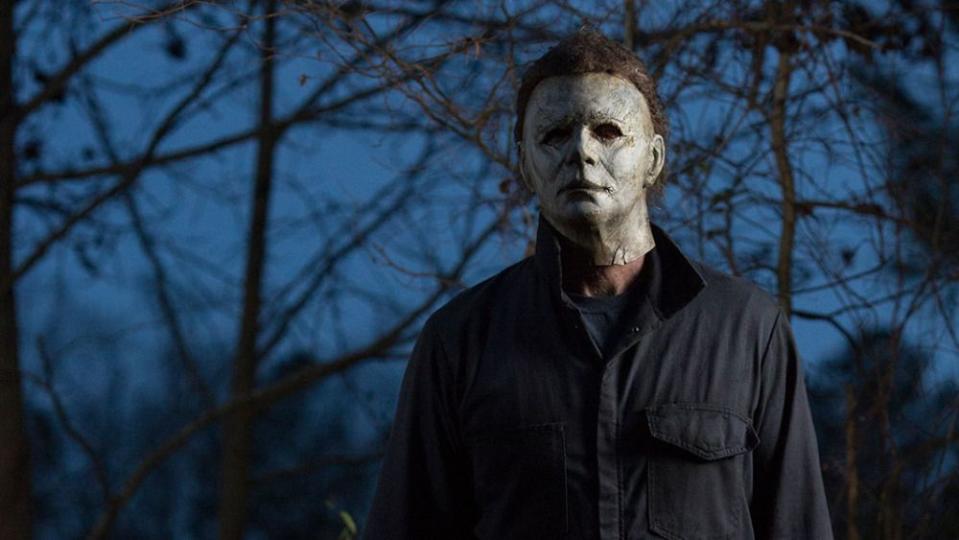
Halloween (Universal)
Some of my favorite parts about Mandy Lane, my first movie, are when the teenagers are hanging out and having these sun-kissed rants. I love being able to linger in those moments and you can do that in horror movies because you’re not just in the moment, you’re building tension. So, I’d definitely be really interested in returning to it. I feel like maybe I’d have to write it because I probably wouldn’t want to do a pre-existing franchise. Like, I wouldn’t want to reboot Friday the 13th.
But horror is a genre that people are really interested in seeing theatrically, and as a filmmaker that wants to see his movies released theatrically, that dialogue with the audience is very important. So, if I could write something that felt like it could be impactful in that way, I think it’d be really fun. It’s also just a genre I love. I love the cinematic possibilities of it. You can do a lot with the camera that you can’t necessarily do in comedy because you end up getting locked in with traditional coverage to get a lot of joke options.
So, yeah, I’m interested in more horror, but I’m interested in doing more drama, too.
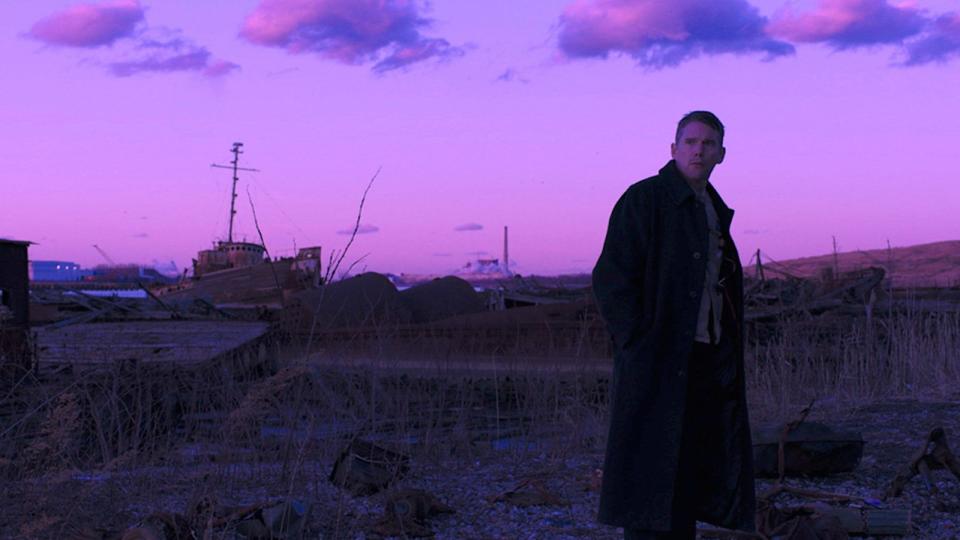
First Reformed (A24)
You worked with Paul Schrader in your salad days. What did you learn from him and do you still keep in touch?
I worked for him. I was getting coffee and stuff. So, I will preface this by saying, I love Paul Schrader, both as a person and as a filmmaker. However, he’s not the most warmest dude in the world, but he was always very kind to me.
Most of what I learned in his office, though, was just from listening and watching. Not just his demeanor, but his whole cult of personality was incredibly impactful for me, not that I adopted any of it, but I could see the confidence in which he carried himself, his relentless interest in artistic integrity, his fuck the world mentality, that was all stuff I just quietly clocked.
I’m not super in touch with him, though, I did e-mail him after I saw First Reformed, and just gushed about it because I think it might be his best movie. It’s certainly the most successful distillation of his thematic interests. I don’t know, I just fucking loved it.
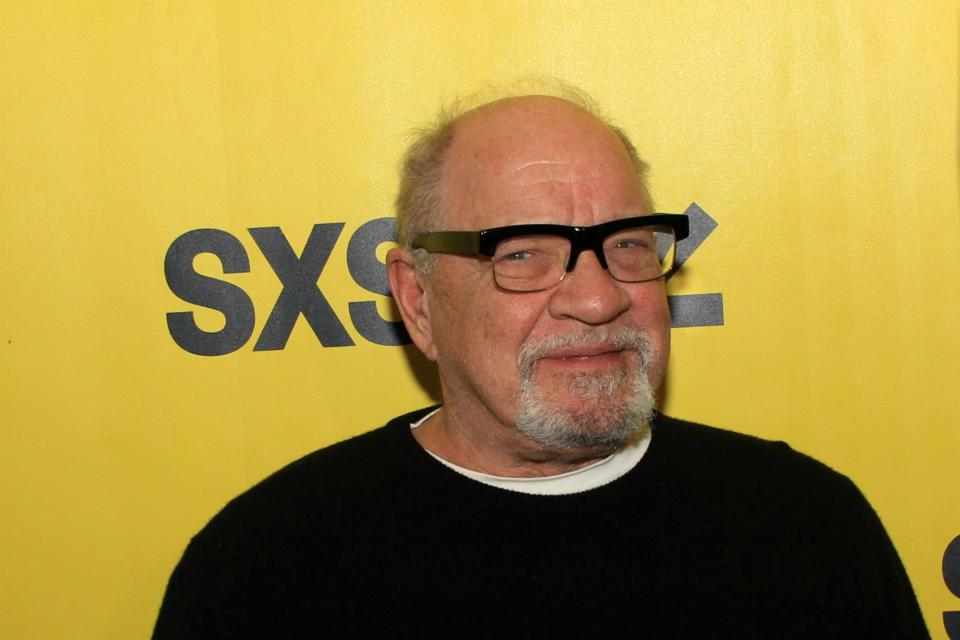
Paul Schrader // First Reformed, photo by Heather Kaplan
Pride is not the right word, because it almost sounds condescending, but it made me feel so good to see him make that movie after years of making different kinds of movies that were not always so successful. To see him just nail it, and the confidence that he directed that film, and how the writing felt as fresh as if it were written by a college guy … it just had this punk rock mentality. Like he’s schooling these kids. This 70-year-old guy.
I was thinking about inviting him to our New York premiere, but I’m too … I don’t know. I’m always a little nervous around him because I’m like an assistant to him, you know? And when i say he was kind, I was such a bad assistant and I fucked up so much shit, and he never yelled at me, so I will always be grateful to that.
—
Long Shot is currently in theaters. Get your tickets now!
